2012年中考英语二轮复习课件教材突破篇(人教版)Period 3 【Units 1-6, Book 7B】
文档属性
| 名称 | 2012年中考英语二轮复习课件教材突破篇(人教版)Period 3 【Units 1-6, Book 7B】 | 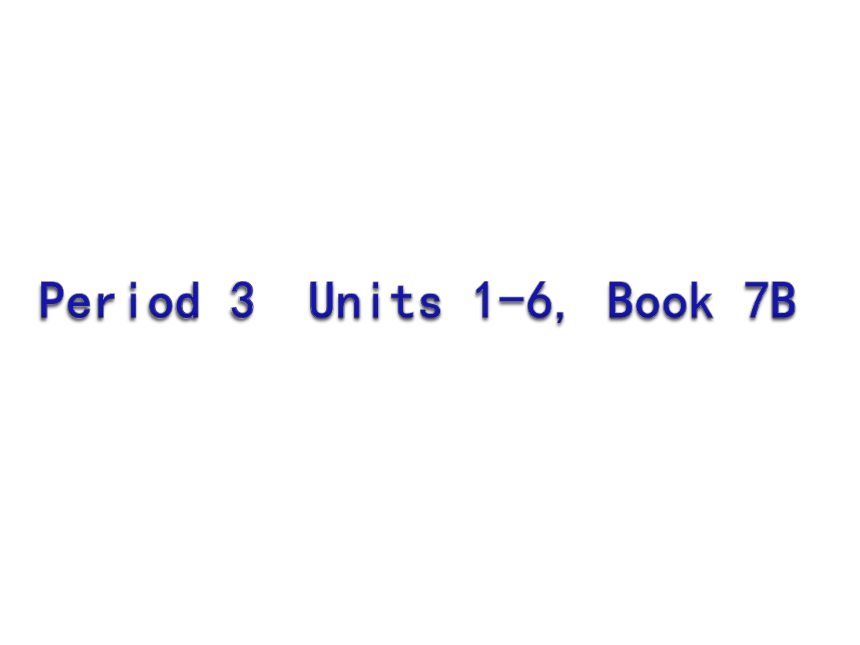 | |
| 格式 | zip | ||
| 文件大小 | 313.2KB | ||
| 资源类型 | 教案 | ||
| 版本资源 | 通用版 | ||
| 科目 | 英语 | ||
| 更新时间 | 2012-03-06 22:22:36 | ||
图片预览

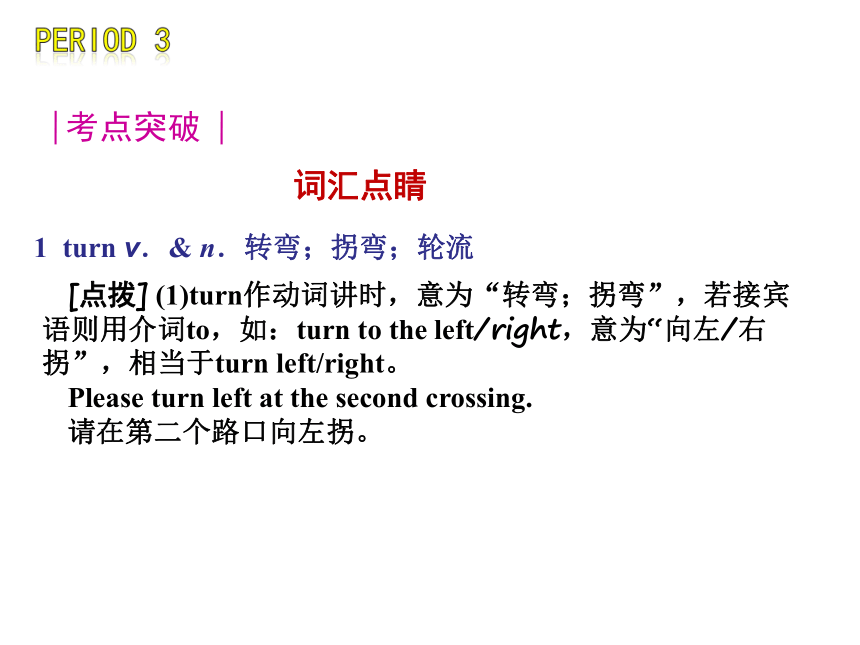
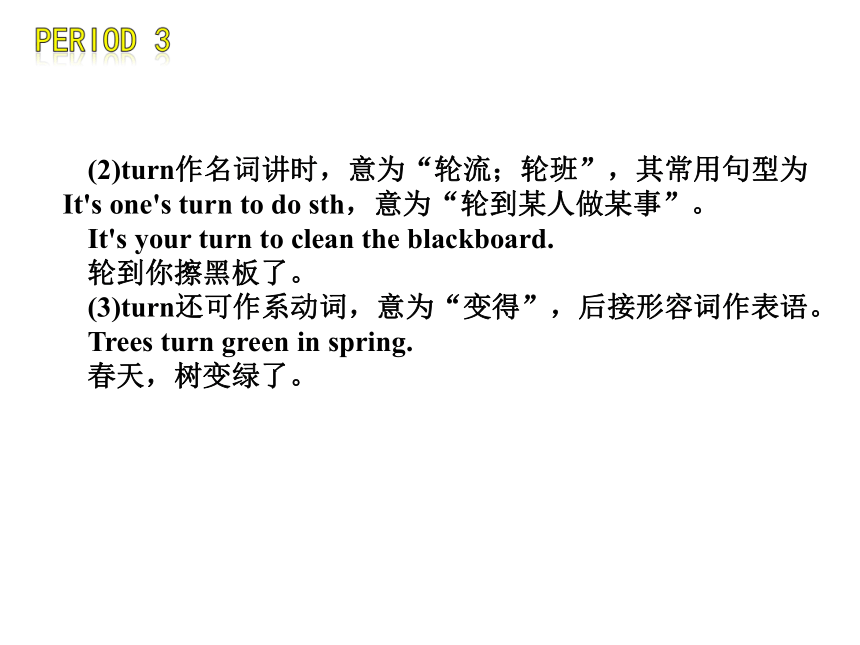
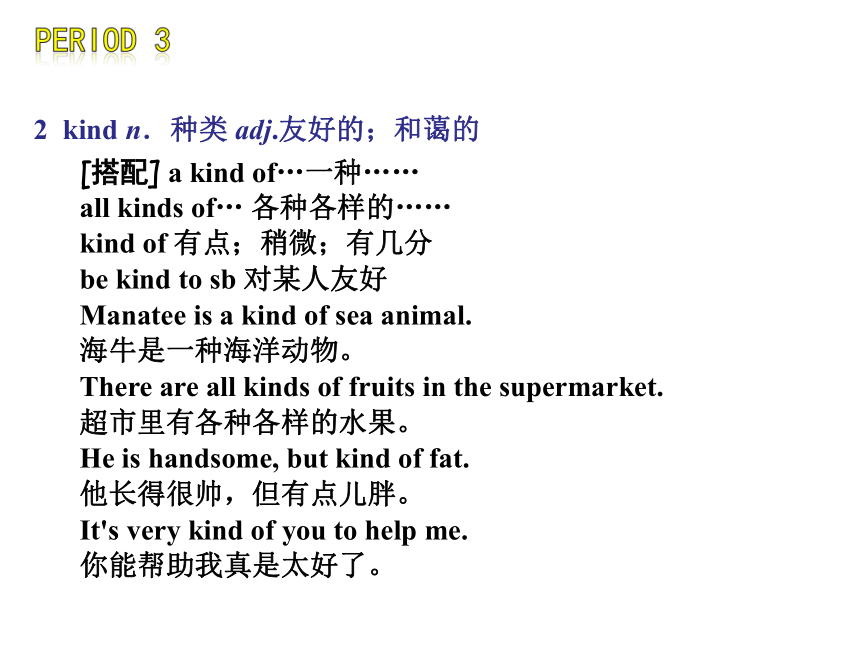
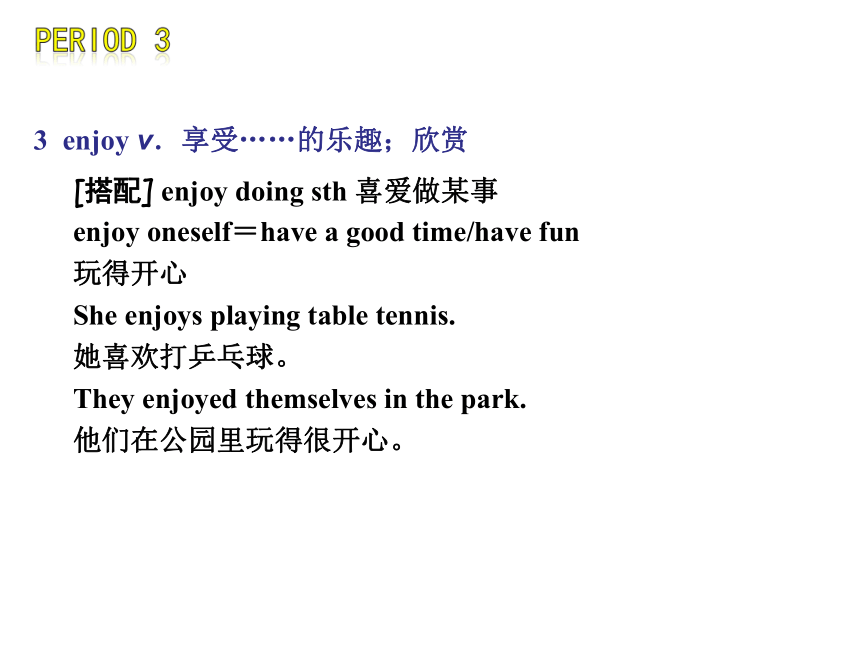
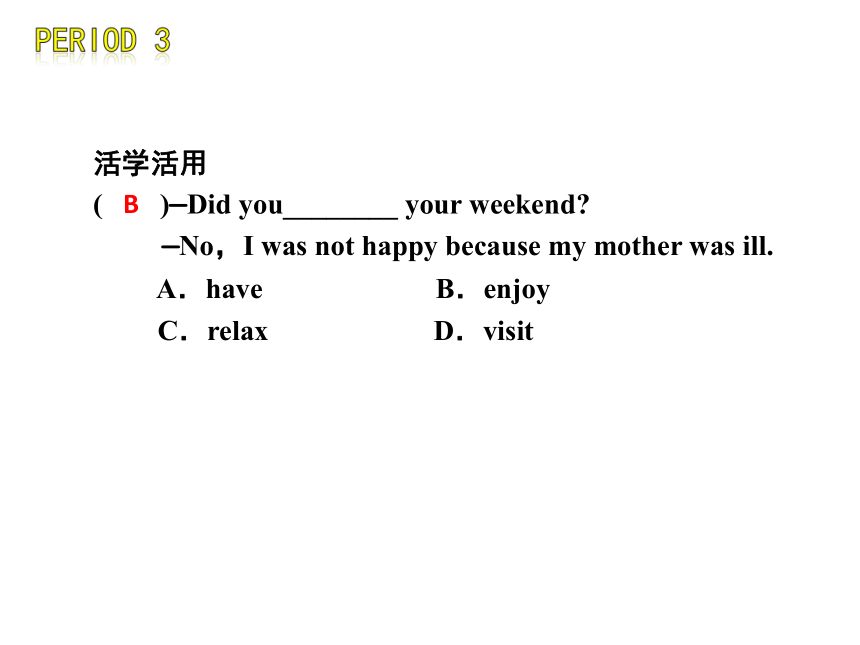
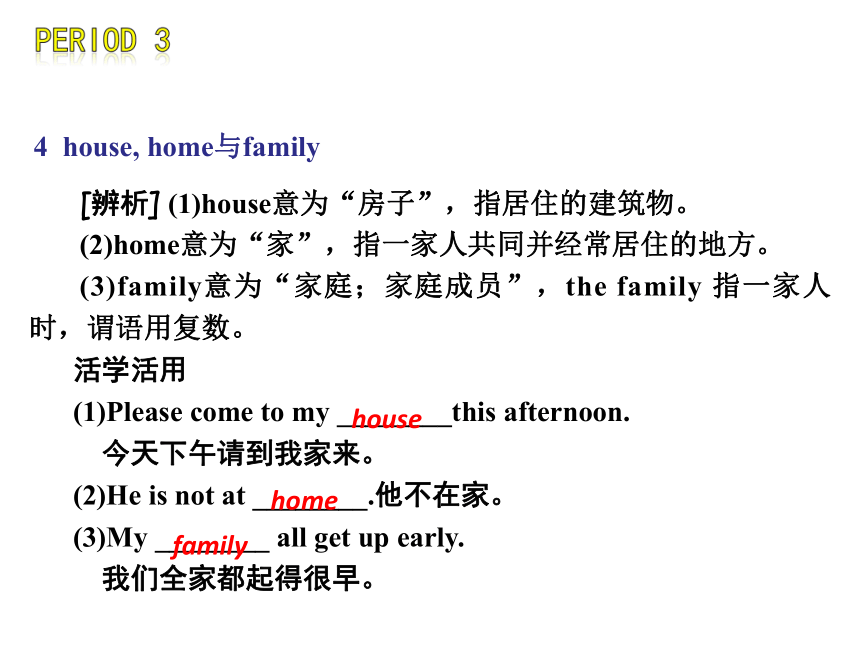
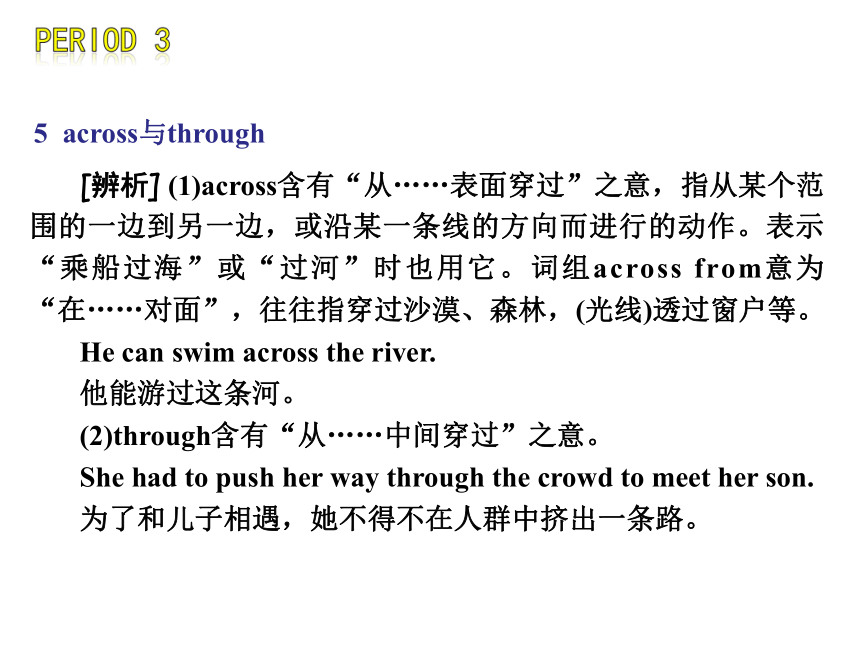
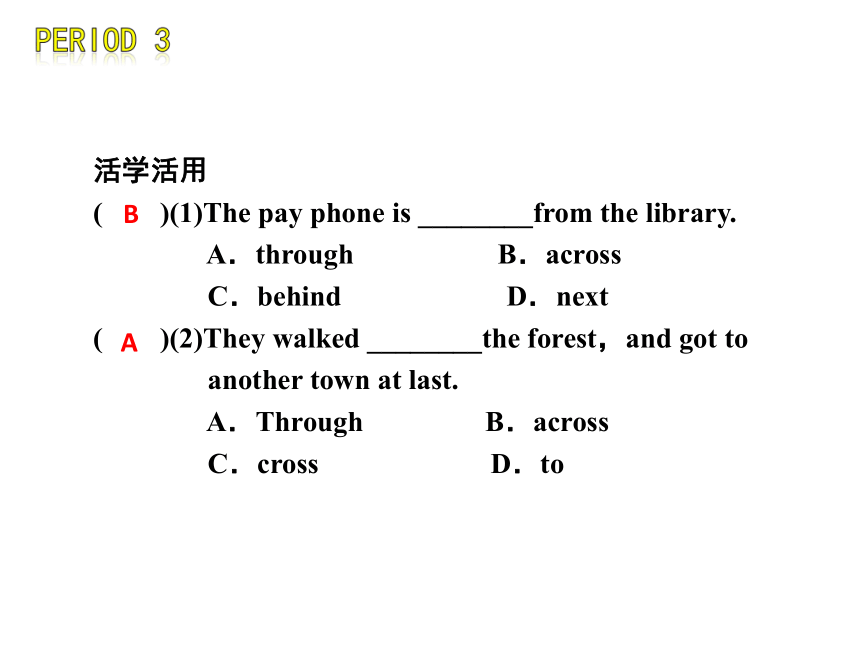
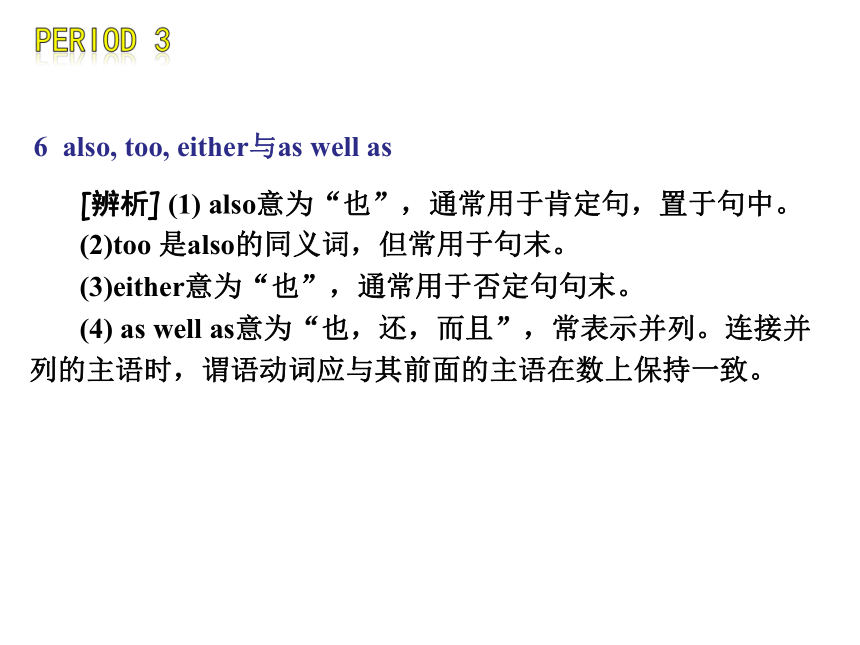
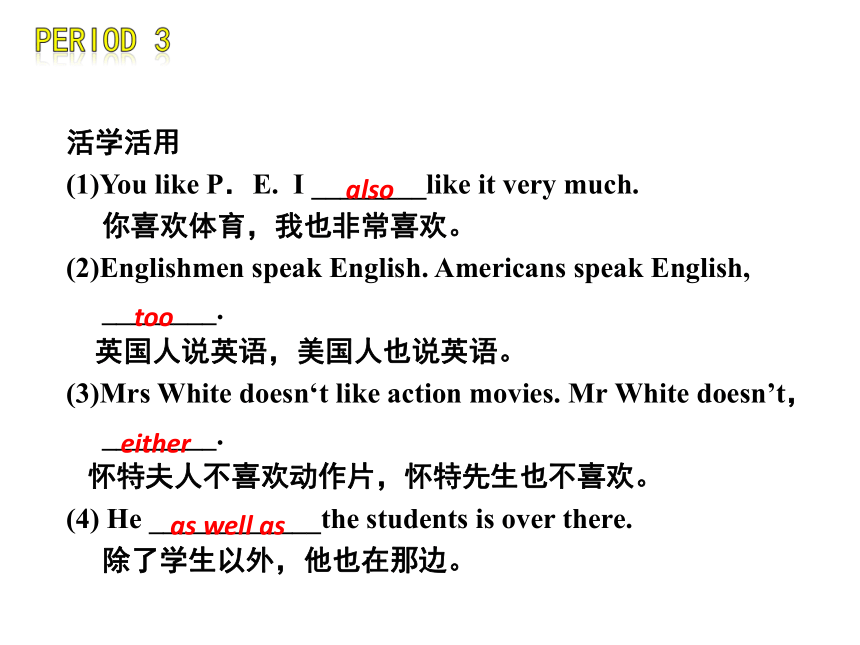
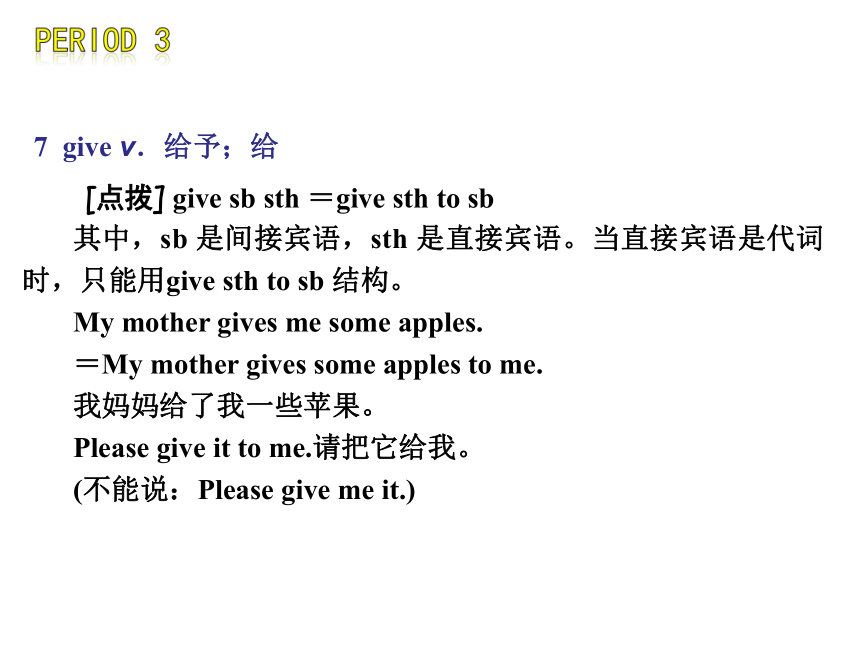
文档简介
(共41张PPT)
·吉林省专用
考点突破
·吉林省专用
词汇点睛
1 turn v.& n.转弯;拐弯;轮流
[点拨] (1)turn作动词讲时,意为“转弯;拐弯”,若接宾语则用介词to,如:turn to the left/right,意为“向左/右拐”,相当于turn left/right。
Please turn left at the second crossing.
请在第二个路口向左拐。
·吉林省专用
(2)turn作名词讲时,意为“轮流;轮班”,其常用句型为It's one's turn to do sth,意为“轮到某人做某事”。
It's your turn to clean the blackboard.
轮到你擦黑板了。
(3)turn还可作系动词,意为“变得”,后接形容词作表语。
Trees turn green in spring.
春天,树变绿了。
·吉林省专用
2 kind n.种类 adj.友好的;和蔼的
[搭配] a kind of…一种……
all kinds of… 各种各样的……
kind of 有点;稍微;有几分
be kind to sb 对某人友好
Manatee is a kind of sea animal.
海牛是一种海洋动物。
There are all kinds of fruits in the supermarket.
超市里有各种各样的水果。
He is handsome, but kind of fat.
他长得很帅,但有点儿胖。
It's very kind of you to help me.
你能帮助我真是太好了。
·吉林省专用
3 enjoy v.享受……的乐趣;欣赏
[搭配] enjoy doing sth 喜爱做某事
enjoy oneself=have a good time/have fun
玩得开心
She enjoys playing table tennis.
她喜欢打乒乓球。
They enjoyed themselves in the park.
他们在公园里玩得很开心。
·吉林省专用
活学活用
( )—Did you________ your weekend
—No,I was not happy because my mother was ill.
A.have B.enjoy
C.relax D.visit
B
·吉林省专用
4 house, home与family
[辨析] (1)house意为“房子”,指居住的建筑物。
(2)home意为“家”,指一家人共同并经常居住的地方。
(3)family意为“家庭;家庭成员”,the family 指一家人 时,谓语用复数。
活学活用
(1)Please come to my ________this afternoon.
今天下午请到我家来。
(2)He is not at ________.他不在家。
(3)My ________ all get up early.
我们全家都起得很早。
house
home
family
·吉林省专用
5 across与through
[辨析] (1)across含有“从……表面穿过”之意,指从某个范围的一边到另一边,或沿某一条线的方向而进行的动作。表示“乘船过海”或“过河”时也用它。词组across from意为“在……对面”,往往指穿过沙漠、森林,(光线)透过窗户等。
He can swim across the river.
他能游过这条河。
(2)through含有“从……中间穿过”之意。
She had to push her way through the crowd to meet her son.
为了和儿子相遇,她不得不在人群中挤出一条路。
·吉林省专用
活学活用
( )(1)The pay phone is ________from the library.
A.through B.across
C.behind D.next
( )(2)They walked ________the forest,and got to
another town at last.
A.Through B.across
C.cross D.to
B
A
·吉林省专用
6 also, too, either与as well as
[辨析] (1) also意为“也”,通常用于肯定句,置于句中。
(2)too 是also的同义词,但常用于句末。
(3)either意为“也”,通常用于否定句句末。
(4) as well as意为“也,还,而且”,常表示并列。连接并列的主语时,谓语动词应与其前面的主语在数上保持一致。
·吉林省专用
活学活用
(1)You like P.E. I ________like it very much.
你喜欢体育,我也非常喜欢。
(2)Englishmen speak English. Americans speak English,
________.
英国人说英语,美国人也说英语。
(3)Mrs White doesn‘t like action movies. Mr White doesn’t,
________.
怀特夫人不喜欢动作片,怀特先生也不喜欢。
(4) He ____________the students is over there.
除了学生以外,他也在那边。
also
too
either
as well as
·吉林省专用
7 give v.给予;给
[点拨] give sb sth =give sth to sb
其中,sb 是间接宾语,sth 是直接宾语。当直接宾语是代词时,只能用give sth to sb 结构。
My mother gives me some apples.
=My mother gives some apples to me.
我妈妈给了我一些苹果。
Please give it to me.请把它给我。
(不能说:Please give me it.)
·吉林省专用
[拓展] 有类似用法的词还有:
buy sb sth =buy sth for sb
pass sb sth =pass sth to sb
show sb sth =show sth to sb
·吉林省专用
8 lie v.躺;位于;说谎 n.谎言
[点拨] (1)lie作动词,意为“躺”时,其过去式、过去分词和现在分词分别为lay,lain和lying。
The girl is lying on the grass.
这个女孩正躺在草地上。
(2)lie作可数名词,意为“谎言”,其复数形式为lies。
[搭配] lie to sb 向某人撒谎
tell a lie 说谎
·吉林省专用
[注意] lie意为“位于”时,后面接不同的介词,表达的含义不同。
“A lies in B”表示“A地点在B地点领土范围之内”;
“A lies on B”表示“A地点与B地点接壤”;
“A lies to B”表示“A地点与B地点隔海/陆相望”。
活学活用
用恰当的介词填空
(1)Shandong Province lies ________ the north of Jiangsu
Province.
(2)China lies ________ the west of Japan.
(3)Taiwan lies ________ the southeast of China.
on
to
in
·吉林省专用
9 wear, put on, dress与(be) in
[辨析] (1)wear表示状态,意为“穿着”。
(2)put on表示动作,意为“穿上,戴上”。
(3)dress意为“给……穿衣”,是及物动词,后接人作宾 语。dress oneself意为“给自己穿衣服”;dress sb 意思是“给某人穿衣”;dress sb up意思是“穿上盛装,乔装打扮”。
(4)(be) in 意为“穿着;戴着”,表示状态,in后可以直接跟表示颜色的名词。
Please put on your coat.It's cold outside.
请穿上你的外套。外面冷。
·吉林省专用
She is wearing a red dress.She looks nice.
她穿着一件红色的连衣裙,看上去很漂亮。
The boy is too young to dress himself.
这个男孩太小了,不会自己穿衣服。
He was all in black.他穿着一身黑。
活学活用
( )I_______ a white uniform. He is ________white, too.
A.wear; in B.wear; wear
C.in; in D.dress; wearing
A
·吉林省专用
10 between prep.介于(两者)之间,常与and连用
[辨析] between与among
between一般指两者之间,among一般用于三者或三者以上的人或物之间。
Our teacher is standing among the students.
我们的老师站在学生中间。
There is no secret between you and me.
你我之间没有秘密。
·吉林省专用
活学活用
( )The little girl is sitting ________ her parents.
A.between B.from
C.among D.of
A
·吉林省专用
11 sometimes adv.有时,不时
[辨析] sometimes, some times, sometime与some time
(1) sometimes=at times “有时”
(2)some times “几次/几倍”,time 作可数名词。
(3)sometime “某时”,表示过去或将来的某个时候。
(4)some time “一段时间”,time作不可数名词。
I'll visit my friend sometime next month.
下个月某个时间我要去拜访我的朋友。
They have been there some times.
他们去过那里几次了。
·吉林省专用
活学活用
( )I'm going to spend ________with my parents.
A.some times B.some time
C.some times D.sometime
B
·吉林省专用
句型透视
1 This is my new pen pal.She's from Australia.
这是我的新笔友。她来自澳大利亚。
[点拨] be from意为“来自于, 是……地方的人”,与come from同义。
[拓展] (1)询问“某人来自某地”的两个句型:
Where+be + 主语 + from
Where+do/does + 主语+come from
(2)句中 Australia 是名词。我们学过的表示国家的名词及其形容词有:
·吉林省专用
America(美国)—American(美国的;美国人)
Canada(加拿大)—Canadian(加拿大的;加拿大人)
Japan(日本)—Japanese(日本的;日本人;日语)
China(中国)—Chinese(中国的;中国人;汉语)
England(英国)—English(英国的;英语)
France(法国)—French(法国的;法国人;法语)
Germany(德国)—German(德国的;德国人;德语)
·吉林省专用
2 The pay phone is in front of the library.
公用电话在图书馆前面。
[辨析] in front of与in the front of
in front of 指在某个范围外部的前面;in the front of 指在某个范围内的前面。
There is a river in front of the house.
房子前面有条河。
He took a seat in the front of the cinema.
他在电影院前排位置坐下了。
·吉林省专用
活学活用
( )The girl is afraid to speak ________ the whole school.
A.in front of B.in the front of
C.behind D.across from
A
·吉林省专用
3 Isn't he cute?难道他不可爱吗?
[点拨] 一般疑问句的否定形式叫否定疑问句,意为“难道不……?”形式上是否定,实际表示肯定意义,表示惊奇、赞许和责备等。答句中yes译为“不”;no译为“是的”。
—Don't you know her name
难道你不知道她的名字吗?
—Yes, I do.不,我知道。/
—No, I don't.是的,我不知道。
·吉林省专用
[注意] (1)句首的助动词与人称一致。
(2)答句中的助动词与问句中的一致。
(3)yes或no的回答要保持前后一致。即:yes后是肯定形式;no后是否定形式。
·吉林省专用
4 What do you do?你是做什么工作的?
[点拨] 询问某人的职业通常有三种句型(以you为例):
What are you What do you do What's your job
[拓展] 英语中的一些职业往往与该职业的活动或工作内容相关,常在动词的词尾加后缀“er”或“or”构成从事此种职业的人的名称。
wait—waiter; work—worker; teach—teacher
sing—singer; clean—cleaner; report—reporter
write—writer; drive—driver; dance—dancer
visit—visitor; act—actor; sail—sailor
还有一种是由“名词+ist”构成。
violin—violinist; journal—journalist
·吉林省专用
5 How's the weather in Beijing
北京的天气怎么样?
[点拨] weather 是不可数名词,不能用a或an修饰。
What fine weather it is!
多好的天气!
不能说:What a fine weather it is!
[拓展] (1)询问天气情况的常用表达方式还有:
What's the weather like
What do you think of the weather
—What will the weather be like tomorrow
—It'll be very cold, but quite sunny.
·吉林省专用
“明天天气怎么样?”
“会很冷,但阳光很好。”
(2)常见的描述天气的形容词有:windy 刮风的;sunny 晴朗的; rainy 下雨的; snowy 下雪的; fine 晴朗的;warm 暖和的;hot 炎热的。
活学活用
( )—________is the weather like in Beijing
—It's windy.
A.How B.What
C.Why D.When
B
·吉林省专用
高频考点
( )1.—Can you ________ Spanish
—Yes, but only a little.
A.tell B.say
C.talk D.speak
( )2.The child can ________ himself now.
A.wear B.put on
C.dress D.have on
D
C
·吉林省专用
( )3.—________?
—She is a reporter. She likes talking to people.
A.How is she
B.What does she look like
C.What does she do
D.Where does she work
( )4.Look! Some children ________ themselves over there.
A.enjoy B.are enjoying
C.enjoys D.to enjoy
C
B
基础过关
·吉林省专用
词汇专练
Ⅰ. 根据句意及首字母提示完成单词
1. Canada is a big c_______ in North America.
2. He usually lives in his grandma's house d______the
weekend.
3. Our school is b_______ a park and a library.
4. Your bedroom is very d____ .Let's clean it.
5. We all know kangaroos come from A________.
ountry
uring
etween
irty
ustralia
·吉林省专用
6. Xi'an is in the w____ of China.
7. You can call the p_____ if you have some trouble.
8. It's d__________ to play football on the street.
9. There are lots of a_______ in the zoo.
10. My father is reading a n_________ in the living room. He
wants to get more news from it.
est
olice
angerous
nimals
ewspaper
·吉林省专用
Ⅱ. 从方框内选词,并用其适当形式填空
1.________ turn yellow in autumn.
2.Lots of ________ come to see the Great Wall every year.
3.Our English teacher often asks us to make a daily report
at the __________ of English class.
4.It's ___________ to swim alone in the river.
5.It's ________ to lie on the beach.
Leaves
visitors
beginning
dangerous
relaxing
·吉林省专用
Ⅲ. 用所给词的适当形式填空
1. Allen works as a ______(wait) in a restaurant.
2. Nobody likes ________(thief).
3. My new teachers and classmates are
very ________(friend) to me.
4. Spring is the__________ (begin) of a year.
5. You're too tired. You need ________(relax) yourself.
waiter
thieves
friendly
beginning
to relax
·吉林省专用
6. There are some ________(child) over there.
7. He is __________(surprise) to hear the bad news.
8. I love ______________(scarf), so I often wear them.
9. Zhang Liangying is my favourite pop ________(sing).
10. —How's the weather today
—It's ______(wind).
children
surprised
scarves/scarfs
singer
windy
·吉林省专用
Ⅰ. 根据汉语意思完成下列句子,每空一词
1. 让我来告诉你来我家的路。
Let me _____ _____ _____ _____ ____ my house.
2. 向前直走并向左转。
_____ ________and______ ______.
3. 雪峰公园是个好玩的地方。
Xuefeng Park is a good place___ _______ ______.
句型专练
tell
you
way
straight
turn
the
to
Go
left
to
have
fun
·吉林省专用
4. 你还喜欢别的什么蔬菜?
_______ ______vegetables do you like
5. 每年有许多人在北戴河度假。
There are many people ___ _________ in
Bei daihe every year.
6. 你爸爸正在商店里等你。
Your father ___ ________ ____ _____
in the store.
What
other
vacation
for
you
on
is
waiting
·吉林省专用
Ⅱ. 句型转换
1. There aren't any elephants in the zoo.(改为单数句)
There_____ ____ ________in the zoo.
2. Mary likes penguins and giraffes.(改为否定句)
Mary________ _____penguins ___giraffes.
3. They like pandas because they're cute.(对画线部分提问)
_____ ____they _____ pandas
4. Tom's mother is selling carrots on the left of the house.
(对画线部分提问)
_______ ____ Tom's mother _______ on the left of
the house?
isn't
an
doesn't
like
or
Why
do
like
What
is
doing
elephant
·吉林省专用
cost与take
这两个词都有“花费”之意,但用法有所不同。
(1)cost只能用物或事作主语,常用于sth costs sb some
money或sth costs some money结构中。
(2)take主要指花费时间,其常见结构为:It takes sb
some time to do sth,it在此作形式主语,真正的主语
是后面的不定式to do sth。
每日一辨
·吉林省专用
考点突破
·吉林省专用
词汇点睛
1 turn v.& n.转弯;拐弯;轮流
[点拨] (1)turn作动词讲时,意为“转弯;拐弯”,若接宾语则用介词to,如:turn to the left/right,意为“向左/右拐”,相当于turn left/right。
Please turn left at the second crossing.
请在第二个路口向左拐。
·吉林省专用
(2)turn作名词讲时,意为“轮流;轮班”,其常用句型为It's one's turn to do sth,意为“轮到某人做某事”。
It's your turn to clean the blackboard.
轮到你擦黑板了。
(3)turn还可作系动词,意为“变得”,后接形容词作表语。
Trees turn green in spring.
春天,树变绿了。
·吉林省专用
2 kind n.种类 adj.友好的;和蔼的
[搭配] a kind of…一种……
all kinds of… 各种各样的……
kind of 有点;稍微;有几分
be kind to sb 对某人友好
Manatee is a kind of sea animal.
海牛是一种海洋动物。
There are all kinds of fruits in the supermarket.
超市里有各种各样的水果。
He is handsome, but kind of fat.
他长得很帅,但有点儿胖。
It's very kind of you to help me.
你能帮助我真是太好了。
·吉林省专用
3 enjoy v.享受……的乐趣;欣赏
[搭配] enjoy doing sth 喜爱做某事
enjoy oneself=have a good time/have fun
玩得开心
She enjoys playing table tennis.
她喜欢打乒乓球。
They enjoyed themselves in the park.
他们在公园里玩得很开心。
·吉林省专用
活学活用
( )—Did you________ your weekend
—No,I was not happy because my mother was ill.
A.have B.enjoy
C.relax D.visit
B
·吉林省专用
4 house, home与family
[辨析] (1)house意为“房子”,指居住的建筑物。
(2)home意为“家”,指一家人共同并经常居住的地方。
(3)family意为“家庭;家庭成员”,the family 指一家人 时,谓语用复数。
活学活用
(1)Please come to my ________this afternoon.
今天下午请到我家来。
(2)He is not at ________.他不在家。
(3)My ________ all get up early.
我们全家都起得很早。
house
home
family
·吉林省专用
5 across与through
[辨析] (1)across含有“从……表面穿过”之意,指从某个范围的一边到另一边,或沿某一条线的方向而进行的动作。表示“乘船过海”或“过河”时也用它。词组across from意为“在……对面”,往往指穿过沙漠、森林,(光线)透过窗户等。
He can swim across the river.
他能游过这条河。
(2)through含有“从……中间穿过”之意。
She had to push her way through the crowd to meet her son.
为了和儿子相遇,她不得不在人群中挤出一条路。
·吉林省专用
活学活用
( )(1)The pay phone is ________from the library.
A.through B.across
C.behind D.next
( )(2)They walked ________the forest,and got to
another town at last.
A.Through B.across
C.cross D.to
B
A
·吉林省专用
6 also, too, either与as well as
[辨析] (1) also意为“也”,通常用于肯定句,置于句中。
(2)too 是also的同义词,但常用于句末。
(3)either意为“也”,通常用于否定句句末。
(4) as well as意为“也,还,而且”,常表示并列。连接并列的主语时,谓语动词应与其前面的主语在数上保持一致。
·吉林省专用
活学活用
(1)You like P.E. I ________like it very much.
你喜欢体育,我也非常喜欢。
(2)Englishmen speak English. Americans speak English,
________.
英国人说英语,美国人也说英语。
(3)Mrs White doesn‘t like action movies. Mr White doesn’t,
________.
怀特夫人不喜欢动作片,怀特先生也不喜欢。
(4) He ____________the students is over there.
除了学生以外,他也在那边。
also
too
either
as well as
·吉林省专用
7 give v.给予;给
[点拨] give sb sth =give sth to sb
其中,sb 是间接宾语,sth 是直接宾语。当直接宾语是代词时,只能用give sth to sb 结构。
My mother gives me some apples.
=My mother gives some apples to me.
我妈妈给了我一些苹果。
Please give it to me.请把它给我。
(不能说:Please give me it.)
·吉林省专用
[拓展] 有类似用法的词还有:
buy sb sth =buy sth for sb
pass sb sth =pass sth to sb
show sb sth =show sth to sb
·吉林省专用
8 lie v.躺;位于;说谎 n.谎言
[点拨] (1)lie作动词,意为“躺”时,其过去式、过去分词和现在分词分别为lay,lain和lying。
The girl is lying on the grass.
这个女孩正躺在草地上。
(2)lie作可数名词,意为“谎言”,其复数形式为lies。
[搭配] lie to sb 向某人撒谎
tell a lie 说谎
·吉林省专用
[注意] lie意为“位于”时,后面接不同的介词,表达的含义不同。
“A lies in B”表示“A地点在B地点领土范围之内”;
“A lies on B”表示“A地点与B地点接壤”;
“A lies to B”表示“A地点与B地点隔海/陆相望”。
活学活用
用恰当的介词填空
(1)Shandong Province lies ________ the north of Jiangsu
Province.
(2)China lies ________ the west of Japan.
(3)Taiwan lies ________ the southeast of China.
on
to
in
·吉林省专用
9 wear, put on, dress与(be) in
[辨析] (1)wear表示状态,意为“穿着”。
(2)put on表示动作,意为“穿上,戴上”。
(3)dress意为“给……穿衣”,是及物动词,后接人作宾 语。dress oneself意为“给自己穿衣服”;dress sb 意思是“给某人穿衣”;dress sb up意思是“穿上盛装,乔装打扮”。
(4)(be) in 意为“穿着;戴着”,表示状态,in后可以直接跟表示颜色的名词。
Please put on your coat.It's cold outside.
请穿上你的外套。外面冷。
·吉林省专用
She is wearing a red dress.She looks nice.
她穿着一件红色的连衣裙,看上去很漂亮。
The boy is too young to dress himself.
这个男孩太小了,不会自己穿衣服。
He was all in black.他穿着一身黑。
活学活用
( )I_______ a white uniform. He is ________white, too.
A.wear; in B.wear; wear
C.in; in D.dress; wearing
A
·吉林省专用
10 between prep.介于(两者)之间,常与and连用
[辨析] between与among
between一般指两者之间,among一般用于三者或三者以上的人或物之间。
Our teacher is standing among the students.
我们的老师站在学生中间。
There is no secret between you and me.
你我之间没有秘密。
·吉林省专用
活学活用
( )The little girl is sitting ________ her parents.
A.between B.from
C.among D.of
A
·吉林省专用
11 sometimes adv.有时,不时
[辨析] sometimes, some times, sometime与some time
(1) sometimes=at times “有时”
(2)some times “几次/几倍”,time 作可数名词。
(3)sometime “某时”,表示过去或将来的某个时候。
(4)some time “一段时间”,time作不可数名词。
I'll visit my friend sometime next month.
下个月某个时间我要去拜访我的朋友。
They have been there some times.
他们去过那里几次了。
·吉林省专用
活学活用
( )I'm going to spend ________with my parents.
A.some times B.some time
C.some times D.sometime
B
·吉林省专用
句型透视
1 This is my new pen pal.She's from Australia.
这是我的新笔友。她来自澳大利亚。
[点拨] be from意为“来自于, 是……地方的人”,与come from同义。
[拓展] (1)询问“某人来自某地”的两个句型:
Where+be + 主语 + from
Where+do/does + 主语+come from
(2)句中 Australia 是名词。我们学过的表示国家的名词及其形容词有:
·吉林省专用
America(美国)—American(美国的;美国人)
Canada(加拿大)—Canadian(加拿大的;加拿大人)
Japan(日本)—Japanese(日本的;日本人;日语)
China(中国)—Chinese(中国的;中国人;汉语)
England(英国)—English(英国的;英语)
France(法国)—French(法国的;法国人;法语)
Germany(德国)—German(德国的;德国人;德语)
·吉林省专用
2 The pay phone is in front of the library.
公用电话在图书馆前面。
[辨析] in front of与in the front of
in front of 指在某个范围外部的前面;in the front of 指在某个范围内的前面。
There is a river in front of the house.
房子前面有条河。
He took a seat in the front of the cinema.
他在电影院前排位置坐下了。
·吉林省专用
活学活用
( )The girl is afraid to speak ________ the whole school.
A.in front of B.in the front of
C.behind D.across from
A
·吉林省专用
3 Isn't he cute?难道他不可爱吗?
[点拨] 一般疑问句的否定形式叫否定疑问句,意为“难道不……?”形式上是否定,实际表示肯定意义,表示惊奇、赞许和责备等。答句中yes译为“不”;no译为“是的”。
—Don't you know her name
难道你不知道她的名字吗?
—Yes, I do.不,我知道。/
—No, I don't.是的,我不知道。
·吉林省专用
[注意] (1)句首的助动词与人称一致。
(2)答句中的助动词与问句中的一致。
(3)yes或no的回答要保持前后一致。即:yes后是肯定形式;no后是否定形式。
·吉林省专用
4 What do you do?你是做什么工作的?
[点拨] 询问某人的职业通常有三种句型(以you为例):
What are you What do you do What's your job
[拓展] 英语中的一些职业往往与该职业的活动或工作内容相关,常在动词的词尾加后缀“er”或“or”构成从事此种职业的人的名称。
wait—waiter; work—worker; teach—teacher
sing—singer; clean—cleaner; report—reporter
write—writer; drive—driver; dance—dancer
visit—visitor; act—actor; sail—sailor
还有一种是由“名词+ist”构成。
violin—violinist; journal—journalist
·吉林省专用
5 How's the weather in Beijing
北京的天气怎么样?
[点拨] weather 是不可数名词,不能用a或an修饰。
What fine weather it is!
多好的天气!
不能说:What a fine weather it is!
[拓展] (1)询问天气情况的常用表达方式还有:
What's the weather like
What do you think of the weather
—What will the weather be like tomorrow
—It'll be very cold, but quite sunny.
·吉林省专用
“明天天气怎么样?”
“会很冷,但阳光很好。”
(2)常见的描述天气的形容词有:windy 刮风的;sunny 晴朗的; rainy 下雨的; snowy 下雪的; fine 晴朗的;warm 暖和的;hot 炎热的。
活学活用
( )—________is the weather like in Beijing
—It's windy.
A.How B.What
C.Why D.When
B
·吉林省专用
高频考点
( )1.—Can you ________ Spanish
—Yes, but only a little.
A.tell B.say
C.talk D.speak
( )2.The child can ________ himself now.
A.wear B.put on
C.dress D.have on
D
C
·吉林省专用
( )3.—________?
—She is a reporter. She likes talking to people.
A.How is she
B.What does she look like
C.What does she do
D.Where does she work
( )4.Look! Some children ________ themselves over there.
A.enjoy B.are enjoying
C.enjoys D.to enjoy
C
B
基础过关
·吉林省专用
词汇专练
Ⅰ. 根据句意及首字母提示完成单词
1. Canada is a big c_______ in North America.
2. He usually lives in his grandma's house d______the
weekend.
3. Our school is b_______ a park and a library.
4. Your bedroom is very d____ .Let's clean it.
5. We all know kangaroos come from A________.
ountry
uring
etween
irty
ustralia
·吉林省专用
6. Xi'an is in the w____ of China.
7. You can call the p_____ if you have some trouble.
8. It's d__________ to play football on the street.
9. There are lots of a_______ in the zoo.
10. My father is reading a n_________ in the living room. He
wants to get more news from it.
est
olice
angerous
nimals
ewspaper
·吉林省专用
Ⅱ. 从方框内选词,并用其适当形式填空
1.________ turn yellow in autumn.
2.Lots of ________ come to see the Great Wall every year.
3.Our English teacher often asks us to make a daily report
at the __________ of English class.
4.It's ___________ to swim alone in the river.
5.It's ________ to lie on the beach.
Leaves
visitors
beginning
dangerous
relaxing
·吉林省专用
Ⅲ. 用所给词的适当形式填空
1. Allen works as a ______(wait) in a restaurant.
2. Nobody likes ________(thief).
3. My new teachers and classmates are
very ________(friend) to me.
4. Spring is the__________ (begin) of a year.
5. You're too tired. You need ________(relax) yourself.
waiter
thieves
friendly
beginning
to relax
·吉林省专用
6. There are some ________(child) over there.
7. He is __________(surprise) to hear the bad news.
8. I love ______________(scarf), so I often wear them.
9. Zhang Liangying is my favourite pop ________(sing).
10. —How's the weather today
—It's ______(wind).
children
surprised
scarves/scarfs
singer
windy
·吉林省专用
Ⅰ. 根据汉语意思完成下列句子,每空一词
1. 让我来告诉你来我家的路。
Let me _____ _____ _____ _____ ____ my house.
2. 向前直走并向左转。
_____ ________and______ ______.
3. 雪峰公园是个好玩的地方。
Xuefeng Park is a good place___ _______ ______.
句型专练
tell
you
way
straight
turn
the
to
Go
left
to
have
fun
·吉林省专用
4. 你还喜欢别的什么蔬菜?
_______ ______vegetables do you like
5. 每年有许多人在北戴河度假。
There are many people ___ _________ in
Bei daihe every year.
6. 你爸爸正在商店里等你。
Your father ___ ________ ____ _____
in the store.
What
other
vacation
for
you
on
is
waiting
·吉林省专用
Ⅱ. 句型转换
1. There aren't any elephants in the zoo.(改为单数句)
There_____ ____ ________in the zoo.
2. Mary likes penguins and giraffes.(改为否定句)
Mary________ _____penguins ___giraffes.
3. They like pandas because they're cute.(对画线部分提问)
_____ ____they _____ pandas
4. Tom's mother is selling carrots on the left of the house.
(对画线部分提问)
_______ ____ Tom's mother _______ on the left of
the house?
isn't
an
doesn't
like
or
Why
do
like
What
is
doing
elephant
·吉林省专用
cost与take
这两个词都有“花费”之意,但用法有所不同。
(1)cost只能用物或事作主语,常用于sth costs sb some
money或sth costs some money结构中。
(2)take主要指花费时间,其常见结构为:It takes sb
some time to do sth,it在此作形式主语,真正的主语
是后面的不定式to do sth。
每日一辨
